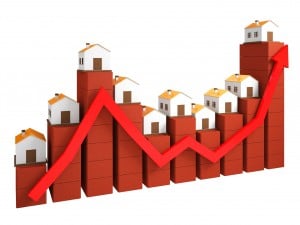We are living in interesting times, aren’t we?
After strong property price growth in all our capital cities last year, now there is evidence that our housing markets will slow down a little in 2022. 
In fact, there’s even talk of property prices falling this year (which by the way…I don’t agree with.)
But the mixed messages in the media will result in two types of property buyers:
- Those who see it as an opportunity to take advantage of a short-term concern in confidence in our property markets
- Those who will sit on the sidelines waiting for the situation to become clear
Just look how well things played out over the last 12 months for those who took a long-term approach this time last year.
But while periods of uncertainty and confusion create opportunities for investors who have a long-term focus, they also create two property sub-markets that are particularly vulnerable in fluctuating environments.
While these markets might look attractive on paper, they can present significant risks for investors.
As always, knowledge is your best defense against error so let’s have a look at these ‘worst markets’ and why they pose a risk to investors.
1. Off the plan apartments
Currently, a new wave of naive property investors is considering buying off the plan hoping to settle on their properties a year or two down the track when they hope property values will have increased substantially.
While buying off the plan isn’t inherently bad in every circumstance, the risks are often much higher, for several reasons.
Firstly, when you buy off the plan, you’re locking in a purchase price at what is meant to be the current market value of a dwelling that won’t be completed for a year or two.
Of course, you hope the property will increase in value during the construction phase and by the time it’s completed you have a little nest egg of equity already in place.
However, that’s not what has been happening over the last few years, and, disappointingly for the buyers, on completion, most off-the-plan properties are valued at considerably less than the contract price.
In my mind, you should get a discount for all the uncertainty that goes with buying a property that has not been completed, but instead marketing costs, agent’s commissions, developer’s margins, and GST add a premium to the price.
That together with the banks’ reluctance to lend as much on this type of property and you’ll need to be able to immediately front the shortfall between the lender’s revised mortgage amount and the purchase price.
Plus you’ll often find hundreds of identical apartments listed simultaneously for sale or lease which will only add fuel to the fire, potentially lowering values further.
As well over the last few years, the concerns about structural integrity have steered many investors and homebuyers buying off the plan properties
And if you purchased to sell at a profit, you might have to reduce your sale price just to stay competitive in a market flooded by investors with the same idea.
At worst, you might find yourself having to hold onto the property if there aren’t enough buyers in the market.
The fact that off-the-plan properties mainly appeal to investors rather than the deeper owner-occupier market, means that’s it’s a property sector to clear of at present ( in fact you’re probably always better to steer clear of these properties.)
2. House and Land packages
For similar reasons, investors should tread carefully around house and land packages.
Sure there’s been a large amount of activity in this segment of the sector of the property market fuelled by first home buyers taking advantage of the various incentives but these types of properties share the same vulnerable characteristics as off-the-plan apartments, in that values can fall during construction, leaving buyers with a gap to pay on completion.
In addition, while you’re getting a shiny new investment with great depreciation benefits, you’re also paying a premium price and don’t have the potential for value-adding to your investment. 
That means you’re relying solely on market movement to gain capital and earn equity which is unlikely because the demographic who buy in these locations are usually interest-rate sensitive.
And while they tend to be hard workers, young family’s wages tend to rise by CPI at best, meaning there is little momentum to push house prices higher.
Sure the outer suburban and more affordable end of the markets have performed strongly over the last year, but affordability is now becoming an issue as the locals have had minimum little wages growth of the time when property prices have boomed.
In these locations, the residents don’t have more money in their pay packet to pay the higher prices the properties are now achieving.
More than that, Covid19 has adversely affected low-income earners to a greater extent than middle and high-income earners who are likely to recover their income back to pre-pandemic levels more quickly, while many have not been hit at all.
And as we start to emerge from our Covid Cocoons there will be a flight to quality properties and an increased emphasis on liveability.
As their priorities change, some buyers will be willing to pay a little more for properties with “pandemic appeal” and a little more space and security, but it won’t be just the property itself that will need to meet these newly evolved needs – a “liveable” location will play a big part too.
Those who can afford it will pay a premium for the ability to work, live and play within a 20-minute drive, bike ride or walk from home.
How should you approach the current market?
During the last few years, FOMO (fear of missing out) led inexperienced investors and homebuyers to purchase almost any property that their budget would allow and they were fortunate as a rising tide lifted all ships.
But as the market matures we will see a flight to quality with well-located A-class homes and investment-grade properties still selling well, but secondary properties having trouble finding buyers.
In essence, there are much safer options available than purchasing off-the-plan properties and house and land packages; ones that aren’t so vulnerable to changes in market conditions. 
I prefer to buy established family-friendly apartments, townhouses, or houses in the inner and middle-ring suburbs of our capital cities where there is a strong demand from affluent owner-occupiers who can afford to and are willing to, pay for them.
These properties tend to have the essential pillars of growth: near great infrastructure and transport, proximity to large job centers, the ability to purchase at fair market value (rather than at a premium), and the option to “manufacture” growth through improvements.
Without a flood of similar properties on the market, as is common with new developments, competition amongst buyers and renters will drive prices and rentals.
This is a foundational growth factor that can be absent in off-the-plan markets.
For me, there are too many risks currently in the off-the-plan and new house markets for property investors.
ALSO READ: I would have been a better property investor if I knew these 12 things earlier in life
team at Metropole.
We help our clients grow, protect and pass on their wealth through a range of services including:
- Strategic property advice – Allow us to build a Strategic Property Plan for you and your family. Planning is bringing the future into the present so you can do something about it now! Click here to learn more
- Buyer’s agency – As Australia’s most trusted buyers’ agents we’ve been involved in over $4Billion worth of transactions creating wealth for our clients and we can do the same for you. Our on the ground teams in Melbourne, Sydney, and Brisbane bring you years of experience and perspective – that’s something money just can’t buy. We’ll help you find your next home or an investment-grade property. Click here to learn how we can help you.
- Wealth Advisory – We can provide you with strategic tailored financial planning and wealth advice. Click here to learn more about we can help you.
- Property Management – Our stress-free property management services help you maximise your property returns. Click here to find out why our clients enjoy a vacancy rate considerably below the market average, our tenants stay an average of 3 years, and our properties lease 10 days faster than the market average.


